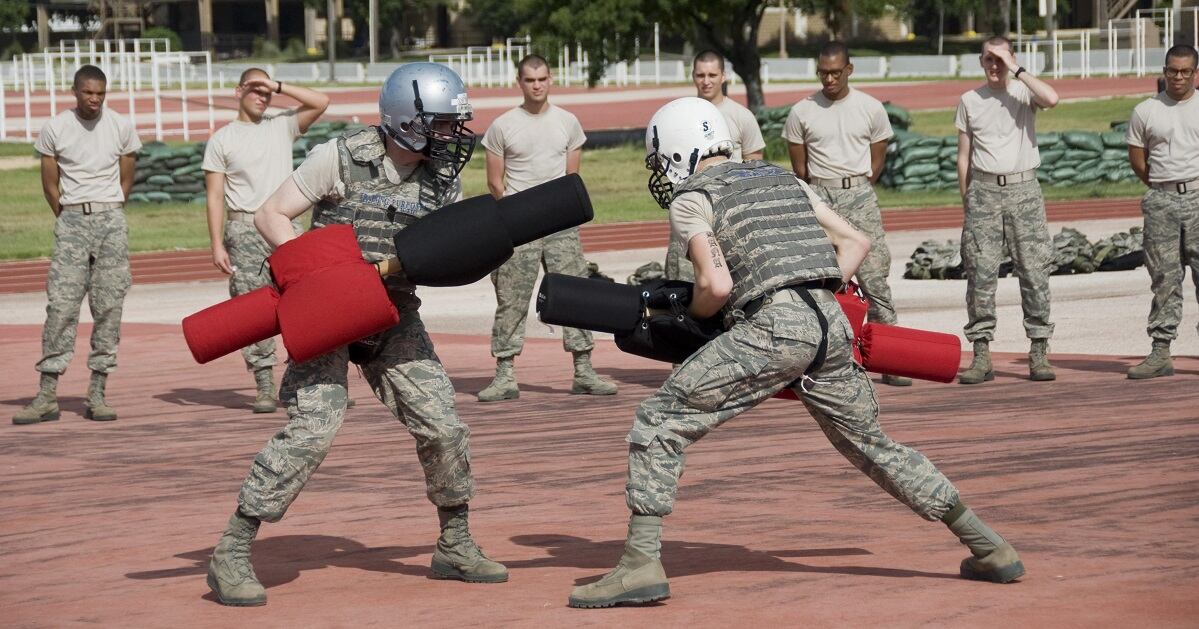Air Education and Training Command completed a pilot program Tuesday that could pave the way for all basic military training students to use tablet devices instead of textbooks.
This is the first time Air Force trainees have learned using tablets, said the project manager, Capt. Tyler Hoff, in a Jan. 15 interview.
The 100 trainees — 52 women and 48 men — in the two flights using tablets were scheduled to take their end-of-course test on Tuesday, said Hoff, a basic military training flight commander with the 321st Training Squadron at Joint Base San Antonio-Lackland in Texas. After that, AETC will start collecting and studying data to decide if it wants to expand tablet use to all BMT trainees.
Switching to a tablet system, Hoff said, will allow AETC to quickly and easily update training materials electronically, instead of having to spend the money reprinting thousands of 500-page textbooks. AETC used Microsoft Surface Pro tablets for this test.
More importantly, the switch to tablets could revolutionize how trainees learn by using artificial intelligence to detect when an individual trainee is getting rusty on a particular subject and steering him or her to a refresher course, he said. AETC is using an online adaptive learning platform called Cerego.
“This pilot [program] really has the potential to be the future of BMT,” Hoff said in a Jan. 13 release.
RELATED

At any given time, AETC has about 7,000 trainees, Hoff said, and the command sends from 35,000 to 45,000 trainees through the pipeline each year. Command officials re-evaluate the basic training curriculum every six months.
With a tablet system, study guides could be updated in real time and quickly pushed out to trainees, Hoff said.
Master Sgt. Paul Lamelin, a military training instructor assigned to one of the flights that began testing the devices Dec. 11, said his trainees learned about the law of armed conflict, the comprehensive airman fitness model and other important subjects through their tablets.
As part of the adaptive learning program, the tablets nudged students when they were forgetting details about certain topics and needed to refresh their memories by going back over the material.
Cerego uses an algorithm to determine which questions a student is struggling with on a particular subject, how long it’s been since he or she studied that material, and whether it’s time to re-introduce that subject to the student. The next time the student uses his tablet, Hoff said, it lets him know the subject is fading from his memory and starts a refresher lesson.
The software also prompts students to start their study time when it’s most beneficial to them, to increase their knowledge retention and provide real-time feedback to instructors on how they’re doing.
“The software is designed to help students learn material more efficiently and retain knowledge longer through an adaptive, personalized learning tool that provides real-time feedback to optimize the learning experience instead of the way we have always done it – through paper textbooks,” said Staff Sgt. Samudra Thio, the BMT pilot project lead who originally had the idea to bring the technology into BMT.
Thio said the new technology will also save time for MTIs.
“Tasks that have been done previously in a manual manner, such as grading academic tests, can be graded electronically and in real-time with the use of technology,” Thio said.
Adjusting to the new tablets was stressful for trainees at first, Lamelin said. But after the first 10 to 14 days, they learned how it functions and adapted to studying with it.
“I’ve had nothing but positive responses from trainees after that acclimation period,” Lamelin said.
AETC disabled the cameras on the tablets, and trainees can only use the devices to access the training materials.
As AETC reviews the results to decide if it wants to expand the tablet-based system, it will largely study the end-of-course exam scores to measure how successful the experiment was, Hoff said. Command officials will also survey the trainees.
Stephen Losey is the air warfare reporter for Defense News. He previously covered leadership and personnel issues at Air Force Times, and the Pentagon, special operations and air warfare at Military.com. He has traveled to the Middle East to cover U.S. Air Force operations.




